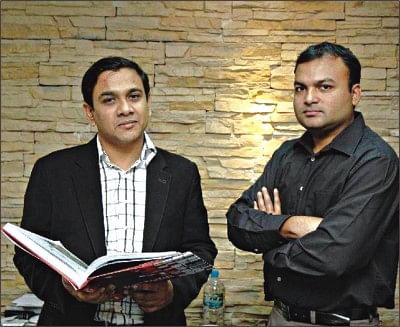Art to business

Sabbir Hassan Nasir, CEO, and Animesh Kundu, managing director of Otobi, right.
Tracing the history of an art to business has been an exhilarating experience. I decided to meet up with Animesh and Sabbir, two young men with a dream of putting Bangladesh on the map, and branding Bangladesh 'world class'.
Having graduated with a first class first from the Institute of Fine Arts (today's Charukola) before the liberation of Bangladesh, Nitun Kundu wanted to be a teacher. Unfortunately time was against him as this was before 1971. To support his family he sought to make use of his creativity and innovative spirit. Thus began his journey, founding Otobi in 1975, with a small Tk 5,000 workshop and a showroom on Elephant Road, Dhaka. The 'workshop' model of business was born.
Single-handedly handled by Nitun, the business prospered. However, Nitun realised that he was not a professional manager and sought help from a consultant in 1991. The consultant sketched out an organogram, policies and procedures that took forward the business in a tangent of growth.
A hard working, determined and passionate person who believed in himself and in Bangladesh, Nitun's dreams have translated into Otobi's three modern plants in Ashulia, Shyampur and Mirpur. With more than 4,000 employees, Otobi is headquartered at Gulshan, Dhaka and has a retail network all over the country. Nitun believed that through determination, sincerity and perfection, anyone in Bangladesh can achieve world class competence. Always an artist in his heart, Nitun's sculptures adorn Bangladesh including the Saarc Fountain and Sabash Bangladesh.
The elderly artist Nitun found solace in his son Animesh's foray in the family business. Animesh, a graduate from Cornell University, USA, on his part, realised that his charismatic and legendary father was an artist and not a proficient businessman. Even though Otobi was perceived as an innovative furniture company, they were losing market share as new muscle flexing competitors entered the market. Animesh joined his father in 2001 to carry forward the legend and translate his father's art to a professional business. He spent time as an internee for two years in all the various departments of the business to learn things hands-on.
Animesh too has his father's sense of humility and realised that he needed professional help in getting the business to the next level. A head-hunter brought Sabbir Hasan Nasir to the Kundu family. Sabbir is a B Sc engineer from Buet, and has an MBA from IBA. His career spans Bata, TetraPak, Golfrate (licensee of Unilever, Nestle and Krafts in Angola) in marketing (brand, category and key account management, sales and distribution), operations, costing and strategic planning. Sabbir sensed the overpowering presence of the senior Kundu and how this was hindering the decision making process in Otobi, and politely declined.
Sabbir however offered to provide them consultancy. Animesh took up that offer. In the next couple of years as their chemistry blended, Animesh and Sabbir dreamt of making Otobi a global brand, designed a strategic roadmap which Animesh followed through. He continued to cajole Sabbir in joining Otobi, which Sabbir continued to refuse.
Towards the middle of 2006, Nitun, in his 70s and sensing his end was near, called Sabbir for a one to one meeting. Even as he was passing the reins of the business to his son, Nitun was seeing the professionalism Sabbir was bringing in to Otobi. Holding his hands, like a father and son, the elderly Nitun quietly requested Sabbir to join Otobi. Sabbir simply could not refuse and joined as the CEO in mid 2006 with Animesh as the managing director.
Thus these two young men brought in an envious professionalism in Otobi - clearing up the years old cronyism, the politicians and the nay-sayers who were holding Otobi back. They have implanted values of innovation, discipline, 'we' as a team and customer focus that is taking roots in the Otobian culture.
Otobi wants to be recognized as a world class retailer of choice and a brand in Asia Pacific in the furniture and furnishing business. With outlets all over Bangladesh and now in India, Otobi has taken the Bangladesh Brand abroad. Pursuing this vision, Sabbir and Animesh have brought in world class business processes to ensure their success. They are implementing SAP, an enterprise management software. To implement their strategy, the balanced scorecard as well as performance management is a normal practice in Otobi. They have innovated their own research and forecasting models.
Business is soaring to new heights. You can sense the pride and the determination of Animesh and Sabbir as they hold Nitun's torch up, keeping him alive through the Otobi brand.
The writer is the managing director of Syngenta Bangladesh Ltd.

 For all latest news, follow The Daily Star's Google News channel.
For all latest news, follow The Daily Star's Google News channel. 



Comments